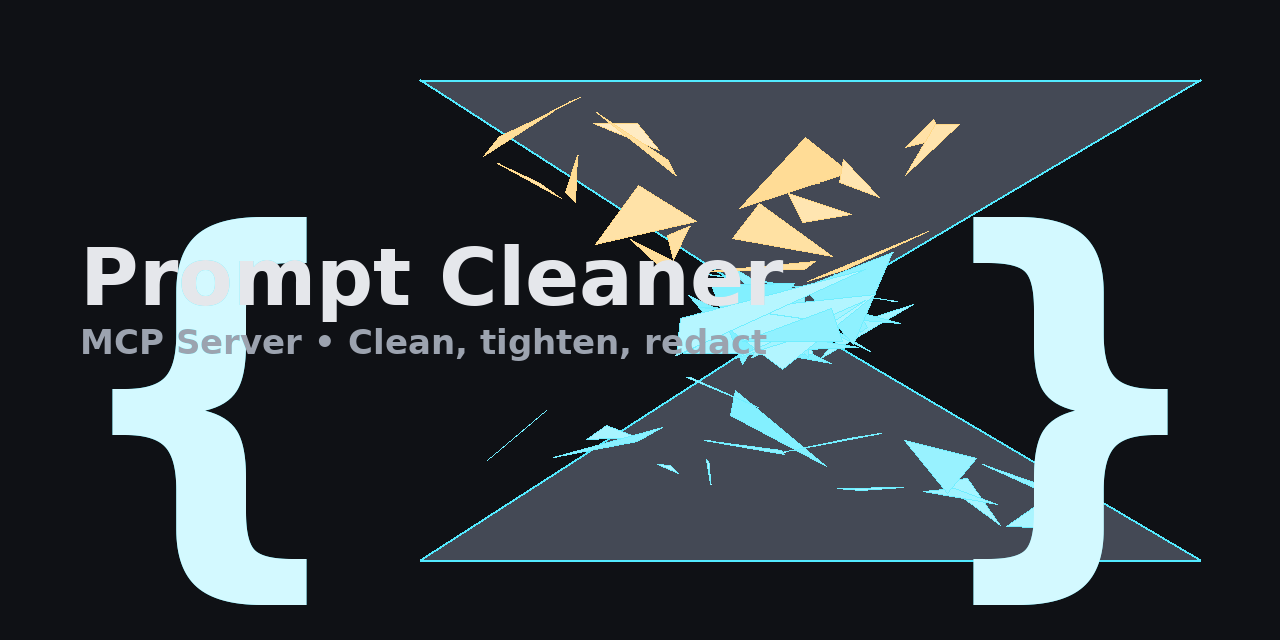Supports OpenAI's API for AI-powered prompt enhancement and cleaning using their language models like GPT-4
Click on "Install Server".
Wait a few minutes for the server to deploy. Once ready, it will show a "Started" state.
In the chat, type
@followed by the MCP server name and your instructions, e.g., "@MCP Prompt Cleanerclean this prompt: 'make a website' with context 'for my bakery'"
That's it! The server will respond to your query, and you can continue using it as needed.
Here is a step-by-step guide with screenshots.
This project was created as an enchancement to Prompt Cleaner that was written in Typescript. As well as an enhancement. This is my 'rosetta' stone project. That I can easily follow to have a deeper understanding on Python. Oh obvious this was Coded with the help of Cursor
MCP Prompt Cleaner

A Model Context Protocol (MCP) server that uses AI to enhance and clean raw prompts, making them more clear, actionable, and effective.
Features
AI-Powered Enhancement: Uses large language models to improve prompt clarity and specificity
Concise System Prompt: Uses a structured, efficient prompt format for consistent results
Context-Aware Processing: Accepts additional context to guide the enhancement process
Mode-Specific Optimization: Supports both "general" and "code" modes for different use cases
Quality Assessment: Provides quality scores and detailed feedback on enhanced prompts
Two-Level Retry Strategy: HTTP-level retries for network issues, content-level retries for AI output quality
Exponential Backoff: Robust error handling with jitter to prevent thundering herd
MCP Integration: Full MCP protocol compliance with stdio transport
Production Ready: Comprehensive test coverage, clean code, and robust error handling
Installation
Using uv (recommended)
Using pip
Note: This project uses pyproject.toml for dependency management.
Configuration
Local LLM (LMStudio) - Default Setup
The server is configured by default to work with local LLMs like LMStudio. No API key is required:
Cloud LLM (OpenAI, Anthropic, etc.)
For cloud-based LLMs, create a .env file in the project root:
Note: .env file support is provided by pydantic-settings - no additional dependencies required.
LMStudio Setup
Download and install LMStudio
Start LMStudio and load a model
Start the local server (usually on
http://localhost:1234)The MCP server will automatically connect to your local LLM
Running the Server
To run the MCP server:
Tool Usage
The server provides a clean_prompt tool that accepts:
raw_prompt(required): The user's raw, unpolished promptcontext(optional): Additional context about the taskmode(optional): Processing mode - "general" or "code" (default: "general")temperature(optional): AI sampling temperature 0.0-1.0 (default: 0.2)
Example Tool Call
The tool is called directly with parameters:
Or via MCP protocol:
Example Response
MCP Client Configuration
Claude Desktop
For Local LLM (LMStudio) - No API Key Required
For Cloud LLM (OpenAI, etc.) - API Key Required
Other MCP Clients
The server uses stdio transport and can be configured with any MCP-compatible client by pointing to the main.py file.
Development
Running Tests
Test Coverage
The project includes comprehensive tests for:
JSON extraction from mixed content
LLM client with retry logic
Prompt cleaning functionality
MCP protocol integration
Project Structure
Requirements
Python 3.11+
MCP Python SDK
httpx for HTTP client
pydantic for data validation
pytest for testing
License
MIT